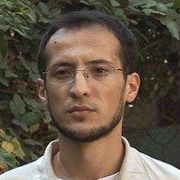
Alisher Saipov
Encyclopedia

Uzbeks
The Uzbeks are a Turkic ethnic group in Central Asia. They comprise the majority population of Uzbekistan, and large populations can also be found in Afghanistan, Tajikstan, Kyrgyzstan, Turkmenistan, Kazakhstan, Russia, Pakistan, Mongolia and the Xinjiang Uyghur Autonomous Region of China...
minority, which reported on human rights abuses in neighbouring Uzbekistan. He was born in Kyrgyz SSR, USSR
Soviet Union
The Soviet Union , officially the Union of Soviet Socialist Republics , was a constitutionally socialist state that existed in Eurasia between 1922 and 1991....
. He often wrote articles critical of Uzbek President Islam Karimov and his government. He also worked as a correspondent for RFE/RL and Voice of America
Voice of America
Voice of America is the official external broadcast institution of the United States federal government. It is one of five civilian U.S. international broadcasters working under the umbrella of the Broadcasting Board of Governors . VOA provides a wide range of programming for broadcast on radio...
. He was shot dead at close range outside his downtown office in Osh
Osh
Osh is the second largest city in Kyrgyzstan, located in the Fergana Valley in the south of the country and often referred to as the "capital of the south". The city is at least 3,000 years old, and has served as the administrative center of Osh Province since 1939...
in October 2007.
A Kyrgyz citizen of Uzbek ethnicity, Saipov had aggressively covered Uzbekistan’s political scene. A month before his slaying, state-controlled Uzbek media had smeared Saipov in publications and broadcasts. He reported being followed by Uzbek security agents.
Natalia Antelava from BBC News
BBC News
BBC News is the department of the British Broadcasting Corporation responsible for the gathering and broadcasting of news and current affairs. The department is the world's largest broadcast news organisation and generates about 120 hours of radio and television output each day, as well as online...
reported: "At twenty-six, Alisher Saipov was one of the most outspoken journalists in Central Asia
Central Asia
Central Asia is a core region of the Asian continent from the Caspian Sea in the west, China in the east, Afghanistan in the south, and Russia in the north...
. (...) He wrote extensively about torture in Uzbek President Islam Karimov's prisons, about the clampdown on dissent and the plight of the Uzbek refugees living in Kyrgyzstan.".
In 2007 and 2008, Kyrgyz investigators said they were probing allegations that Uzbek security agents might have been involved in the murder.
In April 2009, officials announced that they had detained a suspect and recovered the murder weapon. The case first reached first the Osh City Court in late July 2009. Judge Koichubek Zhobonov found insufficient evidence to proceed and sent the case back to investigators. On appeal, prosecutors succeeded in overturning the decision and having the trial judge replaced.
On December 9, 2009 Kyrgyzstan’s Supreme Court ruled that the prosecution of the suspect Abdufarit Rasulov, a former policeman, could proceed. This ruling came in the appeal filed in late October 2009 by Avaz Saipov, the father of Alisher, because in the first handling of the case, investigators had left numerous questions unanswered and failed to address several apparent discrepancies. The suspect has denied involvement in the murder and has said that police beat him, the independent news Web site Uznews reported .
The Kyrgyz Supreme Court ruled that the case of Saipov should be sent back to an Osh city court for further investigation. This ruling meant that the investigation would be conducted by the same court that presided over the initial, inconclusive investigation. Saipov’s father had filed the appeal hoping that his son's murder would be examined by a different court. He had insisted that evidence showed that his son was killed by agents from Uzbekistan in retaliation for critical articles he wrote.
According to critics, the confusion and contradictions around the investigation granted a de facto impunity to Saipov’s killers and raised questions about the commitment of the Kyrgyz government’s commit to solving the case .

